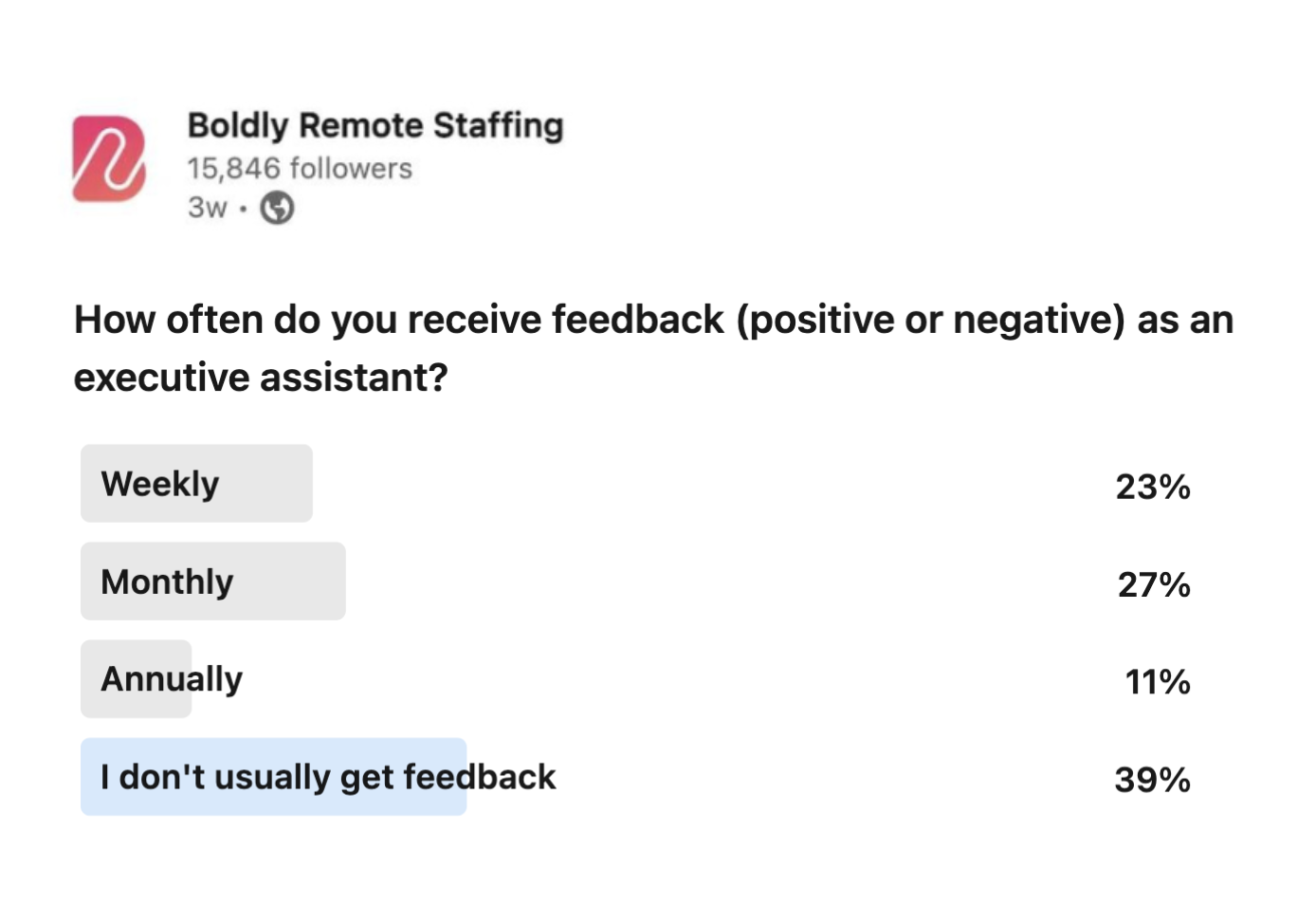Is your executive assistant’s performance review just another box to check or is it a genuine conversation that drives results?
Most executives dread performance reviews. But when done right, regular performance feedback builds companies that are 23% more profitable than those who don’t. Their employees are also 400% more engaged.
At Boldly, our team of premium remote executive assistants receives annual performance reviews; but that isn’t the only time they get feedback. We make it a priority for our employees to check in with the clients they support as well as having candid conversations with their Team Leader.
In this article, we’ll share best practices of the employee performance review process for one of the most important staff members: your executive assistant.
With a productive relationship so deeply reliant on trust, you want to nail it the first time; and every time in the future.
Here’s what we’ll cover:
- What is an executive assistant performance review and what should you cover?
- How should you structure an EA performance review?
- How often should you give your executive assistant feedback?
- A sample checklist for conducting your review
- Setting Measurable Benchmarks for Your EA’s Success
- Tips For Having Difficult Performance Conversations
Let’s get started.
What Is An Executive Assistant Performance Review?
An executive assistant performance review is the process of evaluating the EA’s job responsibilities, skills, accomplishments, and areas for improvement.
These executive assistant performance objectives serve as benchmarks for measuring success and identifying growth opportunities throughout the year.
They’ll often cover:
- Administrative skills – How well does the executive assistant manage calendars and inboxes, coordinate meetings, handle correspondence, and other administrative responsibilities? Is everything done efficiently and accurately?
- Communication skills – Are the assistant’s written and verbal communications professional and clear?
- Organizational skills – Does the executive assistant effectively prioritize tasks, manage deadlines, and maintain orderly systems for information and documentation?
- Problem-solving abilities – How well does the executive assistant anticipate and resolve issues independently, including handling unexpected challenges or changes in plans?
- Proactiveness — Has the executive assistant taken initiative or looked for opportunities to support you or other leaders or improve processes?
- Interpersonal skills — Can the EA collaborate effectively with others, build relationships, and adapt communication styles as needed?
- Confidentiality and discretion — Does the assistant maintain confidentiality and handle sensitive information with discretion and professionalism?
- Professional development — Are there opportunities for the assistant to enhance their skills, pursue training or professional development, and advance in their career?
- Key accomplishments — What is the executive assistant doing really well that you’d like to see more of? The more specific you can be here, the better!
- Areas to improve — What things can your EA do to better support you going forward? What things should they spend less time on? How can they improve?
In addition to evaluating how well your EA executes their day-to-day tasks, the executive assistant performance review is a good time to check in on their feelings about their:
- Workload — How is your assistant feeling about their workload? Are there certain projects or people that are causing them undue stress?
- Work-life balance — Is your assistant able to pursue their hobbies or personal goals outside of work?
- Well-being — How can you support their health, happiness, and personal development alongside their professional responsibilities?
Your executive assistant’s performance review is more than a report card. It should be a structured, purposeful, give-and-take conversation about growth.
How Should You Structure An Executive Assistant Performance Review?
A study published in the Journal of Personnel Psychology found that poorly conducted performance reviews actually hurt more than they help!
To make the best use of everyone’s time, enter the meeting prepared. Many companies have employee performance review templates and/or specific instructions on documentation, scheduling, structure, performance criteria, and the level of formality.
If you need a place to start, here’s a simple executive assistant performance review outline you can follow.
- Prepare
- Gather relevant information including performance data, feedback from colleagues or clients, and any documentation related to the executive assistant’s job description, responsibilities, and achievements.
- Many companies will also have employees complete a self-evaluation ahead of the review.
- Review through all of these and make a note of any talking points you’d like to bring up.
- Set the stage
- Schedule the review meeting (or more likely, ask your executive assistant to schedule it!). Make sure it’s a time and place conducive to open communication and privacy.
- Communicate expectations — outline the purpose and objectives of the performance review to the executive assistant as well as anything they’ll need to bring/prepare ahead of time.
- Emphasize the review’s collaborative and developmental nature.
- Conduct the review
- Begin with open discussion to build rapport. Acknowledge any achievements and recognize the assistant’s contributions, accomplishments, and positive impact on the organization.
- Review the executive assistant’s performance areas.
- Provide specific and constructive feedback on strengths, areas for improvement, and opportunities for growth, supported by examples and evidence if possible.
- Invite the assistant to reflect on their performance, share their perspective, and discuss any challenges or concerns openly and collaboratively.
- Set goals and say thank you
- Set executive assistant performance goals using the OKRs or SMART framework for professional development and performance improvement.
- Sign and complete any paperwork as needed.
- Remember to say thank you to your executive assistant!
You can start the conversation by connecting on a personal level so you can help them grow on a professional one With this approach, it’s less clinical and critical so it can be more collaborative and constructive.
You’re mapping out paths for professional growth. You’re finding better solutions to tricky problems. And you’re handling any unspoken frustrations or uncertainties where miscommunication so often begins.
This doesn’t mean they’re all pleasant. After all, difficult conversations need to happen (more on that in a moment).
Read more: 5 Keys To Revolutionize How You Work With An Executive Assistant [Goals + Examples]
How Often Should You Give Your Executive Assistant Performance Feedback?
We recently asked Boldly’s LinkedIn community of executive assistants how often they receive feedback. While over half responded with weekly or monthly, 39% said they don’t usually get feedback at all!


It’s common for companies to conduct annual reviews every year — but your executive assistant should be getting feedback more regularly.
Traditional annual reviews are becoming outdated. Companies that rely solely on yearly feedback see 20% lower profits compared to those that maintain ongoing conversations. Major companies have already made this shift: Adobe eliminated its annual review system in favor of ongoing feedback. Accenture now asks managers to provide feedback immediately after projects end, and Yahoo dropped its twice-yearly process to replace “big emotive moments” with regular check-ins.
While annual executive reviews provide comprehensive evaluation opportunities, continuous feedback creates a culture of ongoing improvement and eliminates surprises.
Consider the following executive assistant performance review schedule:
- Continuous feedback weekly
- Monthly check-in
- Quarterly goals and progress review
- Annual performance review
With this kind of approach, reviews are less traumatic, more useful, and actually encourage continuous improvement.
Weekly feedback is natural communication. Monthly check-ins might be less formal. Quarterly and annual reviews might be more structured.
Whatever your approach, this kind of schedule is what open communication looks like in practice. Small self-adjustments are possible with the dread of the once-a-year approach.
Executive Assistant Performance Review Sample Checklist
Start by building a checklist for the reviews – it can be the same if it makes sense, or slightly tweaked for each monthly, quarterly, or annual review.
Remember, data is how decisions are made, so a checklist or scorecard should be used and scored consistently. In keeping with the idea of open communication, the questions you ask during the review should encourage discussion.
Here are some ideas for questions to ask your executive assistant, covering four important topics of discussion.
1. Performance + Accomplishments
- What were your goals this year? How well do you feel you met them?
- What obstacles did you face in trying to meet those goals? How did you overcome them?
- What accomplishments from this year are you most proud of? Do you feel that you were recognized for those accomplishments?
- What tasks and projects do you enjoy working on the most? The least? Why?
2. Strengths + Areas For Improvement
- What are your strengths, when it comes to the tasks and duties you perform here? How do they help you with your role?
- What areas do you feel you have room for improvement? What ideas do you have for pursuing development of those necessary skills?
- Provide two or three examples of how you’ve improved your productivity for both yourself as well as for me.
- Do you have ideas on how productivity or efficiency could be improved even more? How have you shared those ideas with others, or taken the first step in that direction?
3. Goals An Executive Assistant Should Set + Professional Development
- What are your goals for the coming year? Which ones do you think are the most important?
- What steps are you taking now to achieve those goals?
- What would you need to help accomplish your goals? Are there professional development opportunities you think you will need in order to meet your goals?
- How will you measure your success towards achieving those goals?
4. Looking To The Future
- What kinds of changes would you like to see within the organization? How can we better use your expertise and skills to make those changes?
- Are there projects or responsibilities you’d like to take on that would help the team and your own professional development?
- What are your long-term career goals?
- How do you see yourself contributing to the success of the organization in the coming year?
Yes-or-no questions should be avoided and rephrased to give your executive assistant a chance to explain as well as think deeper about what you want to know. In this way, it’s a chance to learn from each other.
That’s the simple secret for stellar executive assistant performance reviews: learning from each other.
When a review is open to this approach, a two-way conversation actually ends up pointing both people in one direction — forward.
Setting Measurable Benchmarks For Your EA’s Success
Effective performance reviews rely on quantifiable metrics.
Consider tracking:
- Response time to emails and requests (target: within 2 hours for urgent items)
- Calendar management accuracy (meeting conflicts, double-bookings)
- Project completion rates against deadlines
- Stakeholder satisfaction scores from team members the EA supports
These concrete measurements transform subjective impressions into actionable data that benefits both you and your executive assistant.
Tips For Having Difficult Performance Conversations With Your Executive Assistant
In 2025, companies saw clear success with regular performance reviews. This means executives need to become more comfortable giving feedback on a regular basis; not just during scheduled reviews. Whether it’s during a more formal executive assistant performance review or a less formal feedback session, it’s important to communicate when things aren’t going as expected with your EA. The sooner you can have a difficult conversation about what’s not working, the sooner you can get back on track.
The goal of this conversation should be constructive, not critical.
Here are a few tips to make it easier:
- Schedule a time and place — Do not try to deliver feedback when you’re feeling overly emotional about the situation.
- Prepare thoroughly — Gather specific examples and evidence of the issues you want to address. It can help if you’re able to articulate the impact of whatever problem is occurring.
- Be direct and specific — Clarity is kindness when it comes to difficult conversations and performance. Avoid generalizations or vague feedback.
- Make time for active listening — Give the assistant time to share their perspective and provide input.
- Set clear expectations — Communicate your expectations for improvement and outline the consequences if performance does not meet expectations. Ensure the assistant understands what is required to succeed.
- Follow up regularly — Schedule follow-up meetings to monitor progress, provide ongoing feedback, and offer support or resources as needed.
- Maintain professionalism and respect — Maintain professionalism and respect throughout the conversation, even if emotions are running high. The focus should be on problem-solving, not blaming or shaming.
Ridiculously Talented Executive Assistants
The executive assistant performance review process is worth every moment because a ridiculously talented EA can change your life!
Stu Loeser, founder of Loeser & Co., said: “I was able to increase my productivity easily by 15–20% when I brought my Boldly EA on board.”
Thana Sakis, founder of Gramercy Consulting, said: “My Boldly executive assistant is always thinking ahead and that really helps. [Jenny] doesn’t just get the scheduling done. She’s thinking about impacts.”
Matt Solomon, CEO of advisory firm Center For Enlightened Business, said of his Boldly EA Natasha: “Every time I think I have a good idea it’s something she’s already done for 5 or 10 or 15 years…”
…and the list goes on.
Every investment into this key relationship will make your work, productivity, and life better each day. Follow our strategies to enhance the effectiveness of your executive assistant performance reviews and find out for yourself!




